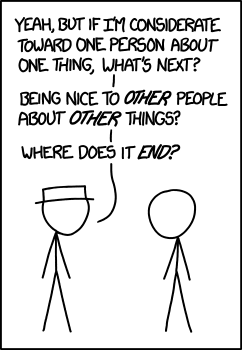Monday, November 30, 2015
Post 7: Slippery Slopes
A slippery slope fallacy is an argument that states that if A happens, then B will happen, where B is an extreme version of A that often requires a lengthy series of unlikely events to occur. These arguments are often used to make reasonable postpositions look like they will lead to an apocalypse. For example, me deciding to go skiing one day might lead to me appearing at a ski mountain, and then ascending to the top. If continued logically, this leads to me going to fast down a trail, hitting a tree, and dying.
Tuesday, November 17, 2015
Problems in Pseudo-scientific thinking Pt 2
Representativeness
In driver's ed, I encountered one of the most misleading statistics I've ever heard. Most car crashes happen within one mile of the driver's home. At first glance, this seems shocking. It suggests that you are most likely to crash a car when driving the roads you are most familiar with. The point of this statistic is to make people be careful wherever they are driving, not just when they are on unfamiliar roads. A more careful examination, however, reveals a very different reality. Nearly every time you drive, you are either starting or ending at your house. When I drive to school and back, over 60% is within a mile. All of my friends live within a mile of me. In fact I only drive roughly one place a week where the majority of my driving is outside this one mile circle. I drive on a new road maybe once a month. Since you are so much more likely to be driving on roads close to you than any other roads, it would be shocking if you managed to have more crashes outside one mile from your home. |
| Alternatively, people may be more likely to listen to Katamari near their house. |
Wednesday, November 11, 2015
Problems in Pseudo-Scientific Thinking: The Parntership of Wrong
Prologue
In my previous blog post, I talked about some of the difficulties our school has with making rational decisions. Here I am talking about a large part of the problem: Partnership for Change. For the uninitiated, PFC is an organization set up by the Burlington and Winooski school districts with the goals to: "shape a hopeful and prosperous future for our two communities, and to ensure that all young people in Winooski and Burlington have the knowledge, skills, and habits they need to thrive."Anecdotes Do Not Make Science
Partnership For Change has a fairly active blog (partnershipvt.org/blog/) with11 pages of posts on a variety of topics. One thing that is notably absent, however, is anything approaching data. There is page after page of anecdotes and discussion, but not one graph nor piece of data about effect of the organization's over $800,000 annual budget. There is one study by the partnership about the best ways to communicate information to parents, and about personalized learning plans. (70% of parents believe Jupiter-grades is very important, half thing PLP's are a good idea, guess which we get rid of and which we add). For a group who's goal is to ensure that all young people in the districts are doing well, it is rather shocking to see that none of the PFC's projects have had any followup on them to see if they work.
Scientific Language Does Not Make Science
Here we will play a game called Identify what PFC has said, and what the Educational Jargon Generator has said. (The educational jargon generator is a website that combines random technobabble here http://www.sciencegeek.net/lingo.html)- Leverage assessment-driven styles for our 21st Century learners.
- Be directly impacted by enhanced learning opportunities due to a robust system of teacher learning and development.
- Learn in an inter-disciplinary, collaborative classroom environment.
- Streamline proactive methodologies to close the achievement gap.
- Regularly communicate and interact to promote understanding so adults are supported as partners in student’s learning.
- Discern technology-enhanced presentations across content areas.
Partnership for Change has said 2 3 and 5
(I am curious how many people can get)
The underlying problem is that the Partnership for Change uses a lot of complicated terminology to justify what are often ideas that have either very mixed evidence behind them, or none whatsoever.
Subscribe to:
Comments (Atom)
